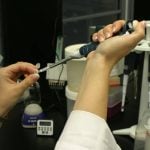Canada’s Competition Bureau will put up no reasons why PotashCorp and Agrium shouldn’t be joined in Nutrien.
The federal antitrust regulator on Monday issued a “no action” letter on the all-stock merger-of-equals that Saskatoon’s PotashCorp and Calgary’s Agrium proposed in September last year. The two companies, when merged, are to be headquartered in Saskatoon under the name Nutrien.
A “no action” position means the bureau doesn’t intend to impose any conditions, require either of the companies to shed any assets relevant to the Canadian fertilizer market, or otherwise challenge the deal.
Read Also

ICE weekly: China, soy complex lift canola prices
China’s upcoming lifting of tariffs and rising soyoil prices lifted Canadian canola values for the week ended Feb. 4, 2026.
The bureau said Monday it had consulted stakeholders in the lead-up to its decision, including the two companies’ customers, competitors, industry groups and government. Several farm groups said last year they would be concerned about the possible loss of pricing power to such a merger.
The deal is still under review in the U.S., China and India, with unconditional clearance already granted from authorities in Brazil and Russia. The two companies said in a separate statement Thursday they now expect to formally close the deal by the end of the fourth quarter of 2017.
In its ruling, the Canadian bureau found the proposed merger “is not likely to lead to a substantial lessening of competition relating to potash in Canada,” where fertilizer customers get their supplies from Saskatchewan potash mines owned by PotashCorp, Agrium, Mosaic Co. and, more recently, K+S Potash.
Specifically, the bureau said, while potash prices globally are tied to those in Canada, foreign producers such as those in Russia are “currently unlikely to constrain a small but significant price increase” in the Canadian market.
Mosaic and K+S “are, or are likely to be, effective supply options for potash in Canada,” the bureau said, adding that it found “fertilizer customers switch between suppliers and source from multiple suppliers simultaneously.”
In the dry phosphate fertilizer market, the bureau said, Mosaic will remain the largest producer of dry phosphate fertilizer in North America even after a PotashCorp/Agrium merger, with Simplot also providing “effective remaining competition.”
Agrium today mines phosphate rock in Idaho and processes MAP (monoammonium phosphate) at plants in Idaho and Alberta, while PotashCorp mines phosphate rock and processes MAP in North Carolina and Florida.
In the liquid phosphate market, both companies make ammonium polyphosphate (APP) as well as superphosphoric acid (SPA), an input used in making APP. Simplot is the only other SPA producer in North America, and all three firms’ plants are located in the U.S.
PotashCorp and Agrium “do not overlap with respect to sales of SPA in Canada, nor was there documentary evidence suggesting that they currently compete for such sales.”
In the nitric acid market, the bureau noted Agrium and PotashCorp each have processing plants in Ohio, but found a “lack of close rivalry” between them for customers in Canada.
Companies in the U.S. supply nitric acid to the Canadian market as well, the bureau said, also noting an unnamed “large producer in Ontario.” U.S. fertilizer firm CF Industries has a plant at Courtright, south of Sarnia.
These other producers, the bureau found, are “effective supply options for different concentrations of nitric acid in Canada.” Nitric acid is used in industrial-grade cleaning, such as in dairy plants, and in processes such as electroplating.
In other markets where the two companies do business, China’s commerce ministry and India’s Competition Commission have both informed PotashCorp they’ll ask it to divest certain “offshore minority ownership interests” before they’ll sign off on the deal.
PotashCorp had also said last Thursday that “final issues” were still to be resolved with both the bureau and the U.S. Federal Trade Commission, dealing with the companies’ businesses in SPA and nitric acid.
Conditions imposed on the deal aren’t expected to affect the $500 million in annual “synergies” PotashCorp and Agrium expect to gain from the merger, PotashCorp added. — AGCanada.com Network















